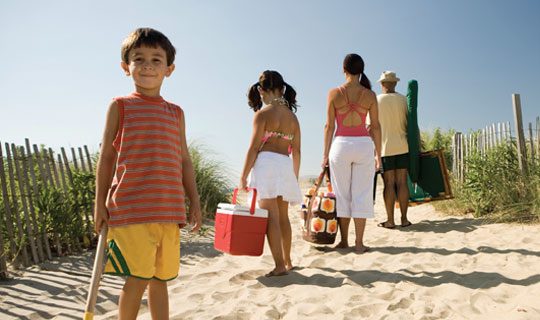How to prevent common causes of seasonal injury and illness.
From hikes in the woods to days at the beach, there’s no shortage of amazing summertime adventures throughout the Garden State. Yet the increase in outdoor activities also raises the risks for injuries.
Here, doctors from RWJBarnabas Health unpack seven common reasons for summertime emergency department visits and offer tips to help you avoid them.
Severe Sunburn
Sunburn can be an emergency. While minorto-moderate sunburns can be treated at home with aloe vera and other over-the-counter remedies, severe sunburn requires emergency treatment. Warning signs include blistering skin and uncontrollable pain. These symptoms may take 12 to 24 hours to develop. Steps to prevent sunburn include using a sunscreen with a sun protection factor (SPF) of 30 or higher. Reapply it every two hours and every time you come out of the water.
Heat-Related Illness
These types of illnesses happen when your body can’t cool its core temperature on its own. Heat exhaustion is marked by heavy sweating, dizziness, nausea and thirst. When heat exhaustion becomes heatstroke, it can cause confusion and even unconsciousness. Heatstroke is a medical emergency— call 911. Older people are typically more likely to suffer from heatstroke. To limit your risk of heat-related illness, stay properly hydrated. Water and fluids with electrolytes are the best options; limit soda and alcohol. Avoid outdoor exercise or other physical activity during the hottest times of day, typically early to mid-afternoon.
Fireworks-Related Incidents
Fireworks are a time-honored summer tradition, but when used improperly, they can lead to serious burns, deep cuts and eye injuries. Reduce your risk by using legal fireworks and following all safety guidelines on the package. Never light fireworks in your hand. Leave duds alone; don’t walk up to them to see why they didn’t ignite. Douse all used fireworks in a bucket of water. If you have any doubts about handling fireworks safely, attend a community event and leave the seasonal show to professionals.
Sports Injuries
A little planning can help you stay on the field or court longer and avoid injuries like muscle sprains, muscle strains and twisted ankles. Always stretch and perform warm-up exercises prior to starting any kind of physical activity. Give yourself time to cool down after you play. Stay properly hydrated. If you’re cycling, skateboarding or riding a scooter, always wear a helmet. Avoid aggressive speed and maneuvers when bicycling, riding a personal watercraft or operating any type of vehicle.
Playground Mishaps
Trips and falls on the playground can lead to scrapes, bruises and lacerations. Keep children safe by always supervising them and limiting running and horseplay as much as possible. Look for playgrounds with softer ground cover, such as rubber or mulch instead of asphalt or concrete. Discourage high-risk activities such as pushing a child higher on a swing than they find comfortable.
Tick Bites
Deer ticks are most active in late spring and early summer. A tick bite can lead to an emergent condition called babesiosis, a bloodstream infection that brings flu-like symptoms such as body aches. Tick bites can also cause Lyme disease, a chronic condition marked by fatigue and joint soreness. Ticks can bite anywhere—in the woods or even in your backyard. Prevention includes wearing moisture-wicking, long-sleeved shirts; long pants; and tall socks to cover your skin. Most people don’t feel tick bites, so check yourself for ticks or signs of a bite when you step back inside.
Barbecue Hazards
Don’t let a friendly get-together go bad. Never light a gas grill with the lid closed. Use only the amount of lighter fluid you need to start a charcoal grill. Cook any meat, seafood or poultry thoroughly. And keep food—along with your guests—safe by refrigerating leftovers so they don’t spoil in the sun.
“Given our proximity to the beach, we see a spike in emergency department visits each summer, but many of them can be prevented,” says Gerardo Chiricolo, MD, Chair of the Emergency Department at Community Medical Center in Toms River. “By taking a few precautions, you can enjoy the fun and sun responsibly and avoid a trip to the hospital.”
“You can have fun and stay healthy with sensible precautions,” says Christopher Crean, MD, an emergency medicine physician at Robert Wood Johnson University Hospital Somerset. “For example, a lot of us underestimate how long we're out in the sun until it's too late, which can lead to sunburn along with serious heat-related illness.”
“Summer is a fantastic opportunity for adults and children to gather, socialize and have a great time,” says Eric Handler, DO, Chair of Emergency Medicine at Cooperman Barnabas Medical Center. “By practicing a little caution and using sound judgment, people can make the most of the sunshine and avoid an unnecessary trip to the emergency department.”
“You can have a fun—and healthy—time by creating an environment of prevention in advance,” says Schubert Perotte, MD, Chair of Emergency Medicine at Jersey City Medical Center. “Set ground rules with children and always pack enough water, sunscreen and protective gear to keep everyone hydrated and safe.”
Smart Ways to Prevent Drowning
According to the Centers for Disease Control and Prevention, accidental drownings lead to about 8,000 emergency department visits nationwide each year. Ways to reduce the risk of drowning and potentially save a life include:
- Know: Small children can drown in shallow water.
- Supervise: Make sure at least one adult swimmer provides constant supervision of any children near or in the water.
- Protect: Install fences and gates around home pools. Consider adding an alarm that alerts you anytime someone goes into the water.
- Restrict: Prohibit children from running around the outside of pools to reduce the risk of slips and falls.
- Teach: Enroll children in swim lessons. Make sure they wear life jackets, vests and floaties in the water if they can’t swim.
- Jump: Never dive headfirst into water unless you know how deep it is. Instead, wade in or jump in feet-first.
- Respect: Always swim near a lifeguard. Heed red-flag warnings for high rip currents at the shore. If you get caught in a rip current, swim parallel to the shore.
Learn about Emergency Medicine at RWJBarnabas Health.





